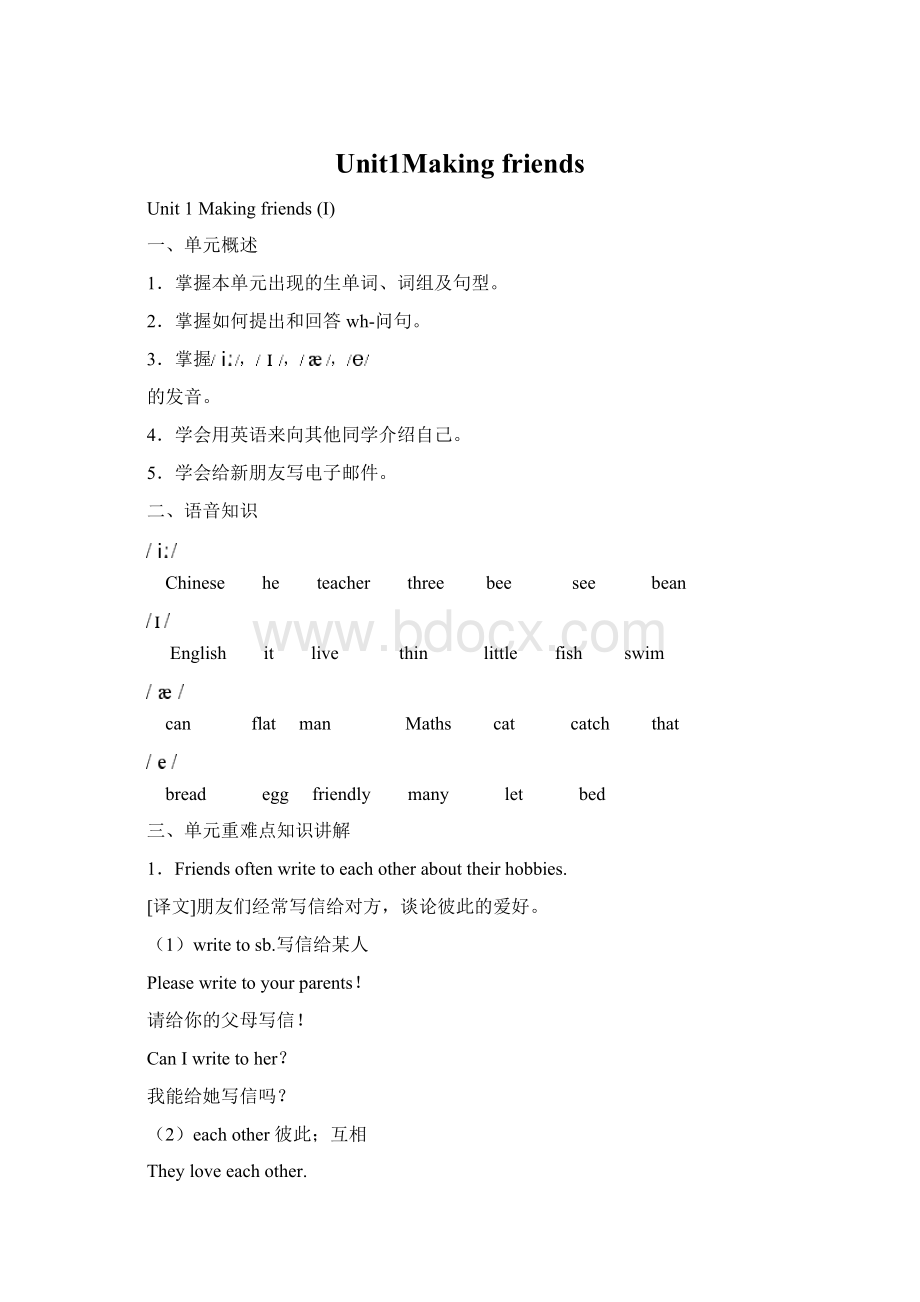Unit1Making friends.docx
《Unit1Making friends.docx》由会员分享,可在线阅读,更多相关《Unit1Making friends.docx(20页珍藏版)》请在冰豆网上搜索。

Unit1Makingfriends
Unit1Makingfriends(I)
一、单元概述
1.掌握本单元出现的生单词、词组及句型。
2.掌握如何提出和回答wh-问句。
3.掌握
的发音。
4.学会用英语来向其他同学介绍自己。
5.学会给新朋友写电子邮件。
二、语音知识
Chinese he teacher three bee see bean
English it live thin little fish swim
can flat man Maths cat catch that
bread egg friendly many let bed
三、单元重难点知识讲解
1.Friendsoftenwritetoeachotherabouttheirhobbies.
[译文]朋友们经常写信给对方,谈论彼此的爱好。
(1)writetosb.写信给某人
Pleasewritetoyourparents!
请给你的父母写信!
CanIwritetoher?
我能给她写信吗?
(2)eachother彼此;互相
Theyloveeachother.
他们爱着彼此。
Theyknoweachother.
他们彼此认识。
延伸:
other家族词汇大比拼:
another,other,others,theother,theothers的用法
①another(=another)表示“别的”,“另一个”,泛指众多中的一个,一般后面接单数名词,前面不加定冠词。
e.g.Thisbookistoodifficultforme.Willyoupleasegivemeanotherone?
②theother表示两个中的一个,常与one连用,one…theother…
e.g.Ihavetwopencils.Oneisred;theotherisblue.
③other+名词=others(别的)
e.g.Somearelisteningtotheradio.OthersarewatchingTV.
④theother+名词=theothers(其余的,相当于therest)
e.g.Someofthestudentsarefromthenorth.Theothers(=theotherstudents)arefromthesouth.
(3)hobby嗜好;业余爱好;hobby的复数形式为hobbies。
e.g.What’syourhobby?
你的爱好是什么?
Myhobbyiscooking.
我的爱好是烹饪。
Whatareyourhobbies?
你有哪些爱好?
MyhobbiesarereadingbooksandstudyingEnglish.
我的爱好是读书和学习英语。
Doyouhaveanyhobbies?
你有什么爱好吗?
2.MynameisAnna.
[译文]我的名字叫安娜。
Mynameis…表示“我的名字叫……;我是……”,是向别人介绍自己的句子。
“Mynameis”同样可以改为“I’m”或者“Iam”(其中“I’m”是“Iam”的缩写形式)。
e.g.MynameisLinLin.(I’mLinLin./IamLinLin.)
我的名字叫林林。
注:
“Mynameis…”可以改为“Myname’s…”(其中“name’s”是“nameis”的缩写形式)
e.g.Myname’sJimmy.
我的名字叫吉米。
3.I’mfromGermany.
[译文]我来自德国。
(1)I’m是Iam的缩写形式。
befrom在句中意思是“从……来”或“来自……”。
常用来询问某人来自何地或某人的籍贯。
注意:
befrom=comefrom
e.g.IamfromCanada.=IcomefromCanada.
我来自加拿大。
SheisfromChina.=ShecomesfromChina.
她来自中国。
Whereareyoufrom?
=Wheredoyoucomefrom?
你来自哪里?
Whereisshefrom?
=Wheredoesshecomefrom?
她来自哪里?
(2)Germany德国;German德国人;德语;德国的
e.g.Heis/comesfromGermany.
他来自于德国。
HeisGerman.
他是德国人。
HespeaksGerman.
他讲德语。
延伸:
America,Canada,China为国家,是名词。
American,Canadian,Chinese是形容词,意为“……的”,或是名词意为“……人”。
e.g.SheisfromAmerica.SheisAmerican.
她来自美国。
她是美国人。
JimisfromCanada.HeisCanadian.
吉姆来自加拿大。
他是加拿大人。
IamfromChina.IamChinese.
我来自中国。
我是中国人。
4.I’m11yearsold.
[译文]我今年十一岁。
“我今年11岁。
”可以有以下几种表达方式:
Iam11.
Iam11yearsold.
Iaman11-year-oldboy/girl.
延伸:
如果你想询问别人的年龄,通常可以使用“Howoldareyou?
”这个问句,但针对不同年龄的人在将问话翻译成汉语时要注意其习惯,要讲礼貌。
e.g.Howoldareyou,boy?
小朋友,你几岁了?
Howoldisyourgrandmother?
你奶奶今年高寿?
注意:
用这句话来提问时要针对问话的主语改变动词be。
e.g.Howoldareyou?
你多大了?
Iam10.我10岁。
Howoldisyourbrother?
你弟弟的年龄是多少?
Heis6.他6岁。
Howoldarethey?
他们多大了?
Theyare12.他们12岁。
5.Ilivewithmyfamilyinahouseclosetosomemountains.
[译文]我和我的家人住在离群山很近的房子里。
(1)livewithsb.表示“与某人住在一起”,同时它还可以表示“与……同居;承认;忍受”。
e.g.Ilivewithmyuncle.
我和叔叔住在一起。
Heliveswithhisgirlfriend.
他和他的女朋友同居。
Wehavetolivewiththefact.
我们得承认事实。
(2)ahouseclosetosomemountains离群山很近的房子。
此处的closetosomemountains为介词短语,相当于一个形容词,用来修饰名词house。
这种类型的介词短语被称为形容词性短语。
e.g.Doyouknowtheboynexttoher?
你认识她旁边的那个男孩子吗?
Bringmethecuponthedesk.
把桌子上的那个杯子拿给我。
6.Ihaveaneldersisterandanelderbrother.
[译文]我有一个姐姐和一个哥哥。
old的比较级为older或者elder,最高级为oldest或者eldest。
elder是用在比较辈分的,一般是比较有特殊关系的几个人时用的。
例如家里有几个孩子,长子就可以用elder来形容。
older是主要用于比较年龄的,比较的人可以没有特殊关系,不是亲属等。
e.g.Sheisolderthanmybrother.
她比我的哥哥大。
Sheismyeldersister.
她是我的姐姐。
elder和eldest可用来表示兄弟和子女的长幼顺序。
myeldersister我的姐姐
myeldestbrother我的大哥
theireldestson他们的长子
7.Everyday,Igotoschoolbyschoolbus.
[译文]我每天乘坐公交车上学。
byschoolbus的意思是“乘坐校车”,表示的是一种交通方式。
英语中常用交通方式的表达方法如下:
(1)用“by+交通工具”表示交通方式。
如:
bybike,bybus,bycar,byplane,bytrain,bysubway等。
但是,“步行”用onfoot,而不是byfoot。
e.g.Theygotoschoolbysubwayeveryday.
他们每天乘地铁去上学。
注意:
by后面的交通工具名词是单数,而且名词前面不能加任何修饰词。
(2)用“takea+交通工具”表示交通方式。
如:
takeabus,takeatrain,takeaship,但“骑自行车”要用rideabike来表示。
e.g.Mr.Whiteoftentakesatraintowork.
怀特先生常坐火车去上班。
(3)用某些动词短语来表示交通方式。
如:
walkto步行去;driveto开车去;rideto骑马/车去;flyto乘飞机去等。
注意:
如果后面接地点副词here,there,home等,介词to应省去。
e.g.Iwalktoschool.Youcandrivethere.
我步行去学校。
你们可以开车去那儿。
(4)用“by+水、陆、空等”来表示交通方式。
如:
bywater从水路;byland经陆路;bysea经海路;byair乘飞机等。
e.g.IgotoBeijingbyair.
我坐飞机去北京。
8.Ilikemyschoolbecausetheteachersareallveryfriendly.
[译文]我喜欢我的学校,因为老师们都很友好。
这个句子是一个由because引导的原因状语从句。
是用来说明引起主句这个结果的原因的从句,在初中阶段引导原因状语从句的从属连词主要的有because,as,since,for等。
e.g.Idon’tliketheroombecauseitisverydirty.
我不喜欢这个房间,因为它很脏。
Sinceeverybodyishere,let’sbeginourlesson.
既然大家都来了,让我们开始上课吧。
Asyouarepoor,youshouldsavemoney.
既然你没钱,你就应该节约。
Iaskhertostaytotea,forIhavesomethingtotellher.
我请她留下来喝茶,因为我有事要告诉她。
9.Iamgoodatswimmingandplayingbasketball.
[译文]我擅长游泳和打篮球。
“begoodatdoingsth.”的意思是“擅长做某事”,它与“dowellin…”可以互换。
e.g.Sheisgoodatsinging./Shedosewellinsinging.
她擅长唱歌。
Iamgoodatdriving./Idowellindriving.
我擅长驾驶。
10.Iwanttomakefriendswithyoungpeoplefromallovertheworld.
[译文]我想和全世界的年轻人交朋友。
makefriendswith…和……交朋友
e.g.TrytomakefriendswithAnna.Shewillbeyourgoodfriend.
试着与安娜做朋友,她会成为你的好朋友的。
Youcanmakefriendswiththem.
你可以和他们交朋友。
同步练习
单项选择。
1.Sheisa_______student.
A.12-year-old
B.12old
C.12yearsold
D.12yearold
2.Jimmy_______soccerafterschool.
A.likeplay
B.likesplay
C.likeplaying
D.likesplaying
3.JimmyandJim_______twins.
A.is
B.am
C.are
D./
4.CaiSisioften_______inthemorning.
A.practicespeak
B.practicespeaking
C.practicesspeak
D.practicesspeaking
5.I_______fromCanada.
A.comes
B.am
C.is
D.are
6.Mysisteroftenplays_______basketballafterschool.
A.a
B.the
C.an
D./
7.That’snotmybook.It’s_______.
A.Lucy
B.Lucybook
C.Lucy’sbook
D.bookLucy
8.Myunclelikes_______chessafterwork.
A.play
B.played
C.playing
D.plays
9.Heismy_______brother.
A.theyoungest
B.younger
C.youngger
D.younggest
10.I______Kate.Mydog______Wangwang.
A.am,am
B.am,is
C.is,am
D.is,are
提示:
1.A 12-year-old可以用来修饰名词。
2.D Jimmy是三人称单数,所以like首先要用单数,即加s,而like后接动词要接动词的ing形式,因此正确答案为D。
3.C JimmyandJim是两个人,为复数,所以be动词用are。
4.D CaiSisi是三人称单数,所以practice首先要用单数,即加s,而practice后接动词要接动词的ing形式,因此正确答案为D。
5.B befrom…来自于……。
此处主语为第一人称,所以不能选A。
6.D play后面加球类名词时中间不要任何的冠词。
7.C 根据句子意思,“那不是我的书,是Lucy的书”。
在人名后加’s表示名词所有格,表示这个人“的”。
8.C likedoingsth.表示“喜欢做某事”。
9.B 句子意思为“他是我的弟弟”。
10.B I后面要用be动词am,mydog是三人称单数,be动词用is。
窗体底端
B 卷
一、根据划线部分提问。
1.Heis11.
_________old_________he?
2.MymothercomesfromAmerica.
_________doesyourmother__________________?
3.SheisinClass4.
_________class__________________in?
4.Shegoestoschoolbybike.
__________________shegotoschool?
5.Myhobbiesareswimmingandreading.
__________________yourhobbies?
二、从II栏中选出与I栏中相应的答语。
I II
( )1.Goodafternoon!
A.Thankyou.
( )2.Nicetomeetyou. B.Fine,thankyou.
( )3.Howareyou?
C.Goodafternoon.
( )4.Howdoyoudo?
D.Nicetomeetyou,too.
( )5.WelcometoBeijing. E.Howdoyoudo?
Unit1Makingfriends(Ⅱ)
一、单元概述
1.掌握本单元出现的生单词、词组及句型。
2.学会正确地使用不定冠词a或者an。
3.掌握/p/,/b/的发音。
4.学会阅读和书写电子邮件。
二、语音知识
/p/help pen people ship Peter painting picture park
/b/baby big bus hobby bath bowl
三、单元重难点知识讲解
1.IwanttobecomeAnna’se-friendbecauseIwanttolearnaboutGermany...
[译文]我想成为安娜的网友,因为我想学习德语……
(1)wanttodosth.想做某事
e.g.Iwanttoseeyou.
我想见你。
Shewantstogohome.
她想回家。
wantsb.todosth.想让某人做某事
e.g.Iwantyoutobringmethebook.
我想要你把那本书递给我。
Iwanthimtolivewithus.
我希望他能跟我们一起住。
(2)learnabout学到(知识等);了解
e.g.IwanttolearnaboutthehistoryofAmerica.
我想了解美国历史。
WehavealotmoretolearnaboutEnglish.
关于英语,我们要学习的还有很多。
2.Whenyoulistentoaconversation,youneedtopayattentiontothewh-questions.
[译文]当你在听一个对话的时候,你需要注意wh-问句。
(1)listento听;听取(意见等)
e.g.Listentotheteachercarefully!
认真听老师讲课!
Weshouldlistencloselytoourparents’idea.
我们需要听取父母的意见。
(2)when在这里表示时间,意为“当……时;在……的时候”。
e.g.Whenyouseehim,pleasesayhellotohim.
当你见到他时,请代我向他问好。
HelookedasidewhenIspoketohim.
我对他说话的时候,他向旁边看。
(3)payattentionto注意;留心;重视
e.g.Weshouldpayattentiontothisfromtheverybeginning.
我们从一开始就要注意这个问题。
Hewantspeopletopayattentiontohismusic,nothisfamily.
他只想让人们注意他的音乐,而不是他的家庭。
3.IsawyourblogontheinternetandI’dliketobeyoure-friend.
[译文]我在网上看到了你的博客,我希望能成为你的网友。
(1)saw在这里是see的一般过去式,这个句子使用了一般过去时态,表示过去发生的动作。
e.g.IfellinlovewithherwhenIfirstsawher.
我对她一见钟情。
Isawthemrunningtogetheralongtheroadyesterday.
我昨天看见他们沿着马路一起跑。
(2)ontheinternet在互联网上
e.g.Hespendsmostofhistimeontheinternet.
他大部分的时间都在上网。
Ifoundthisinformationontheinternet.
我在网上发现了这个信息。
(3)I’dlike是Iwouldlike的缩写形式,wouldlike后面通常接动词不定式,即:
wouldliketodosth.
e.g.I’dliketohaveacupoftea.
我想要喝一杯茶。
Iwouldliketogowithyou.
我愿意跟你一起去。
Wearesmallbutwewouldliketohelpyou.
虽然我们个头小,但是我们愿意帮您。
(4)e-friend网友
e.g.Hi,Iamyournewe-friendnow!
你好,我是你的新网友!
Milliehasanewe-friendcalledTommy.
米莉有个名叫汤米的新网友。
4.Ihaveshort,blackhair.
[译文]我拥有又黑又短的头发。
生活中常见发型的表达:
longcurlyhair长的卷曲的头发
shortstraighthair短的直发
shortblackhair短的黑发
longblondwavyhair长的金黄色的波浪发
延伸:
当要询问某人的外貌时,通常使用:
Whatdo/doessb.looklike?
e.g.Whatdoesyourfatherlooklike?
你爸爸看起来是什么样子的?
WhatdoesMr.